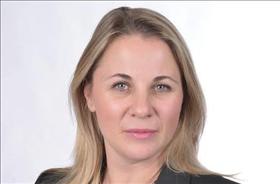What drives MK Svetlova's pluralistic vision for Israel?
MK Ksenia Svetlova: Proud advocate for religious freedom
Journalist-turned-MK Ksenia Svetlova deliberately injected the politically unpopular question of religious freedom back into the public discourse after being elected to the Knesset. What drove her?
David Bogomolny 15/06/2015 12:44
Tags: Knesset · pluralism · advocacy · Ksenia Svetlova

MK Ksenia Svetlova
After the 2015 elections, newly elected MK Ksenia Svetlova was profiled in the Jerusalem Post, and after an election cycle that saw matters of religion and state ignored almost entirely, the journalist-turned-MK deliberately injected the politically unpopular question of religious freedom back into the public discourse.
Most Israelis vote on matters of national security or economic issues; making Svetlova’s focus on civil unions, funding for the non-Orthodox streams of Judaism and other such religious matters both unexpected and refreshing. Hiddush requested a meeting with her, and unsurprisingly, she was already familiar with our consistent exposure of religion and state issues in Israel through public opinion polling, advocacy, legal actions and the media.
Between an impromptu Knesset Channel interview and an unexpected meeting called by Zionist Camp head MK Isaac Herzog, Svetlova made the time to speak with us. An experienced journalist, she was eloquent and thoughtful.
When Svetlova and her mother made Aliyah after the fall of the Soviet Union, then-Minister of Education Zevulun Hammer of the National Religious Party encouraged her mother to enroll her teenage daughter at a Zionist religious school in Jerusalem. She recalls her school very fondly, explaining that it was a “soft landing” for her as a young, Russian olah in Israel. The environment was kind and welcoming, and she was Orthodox during those years, supported fully by her mother at home. Always a person of faith, the young woman found herself increasingly troubled by the non-egalitarian nature of Orthodoxy, but was discouraged at school from exploring her local Reform community and eventually drifted from religious practice almost entirely.
Ksenia Svetlova considers it her responsibility as a Knesset Member to raise awareness of pluralism and the liberal denominations in Israel. Most of the public, she says, is unaware of the alternatives.
Over the years, the worldly journalist gained exposure to the egalitarian, non-Orthodox denominations of Judaism, and drew inspiration from her longtime friend Rabbi Gregory Kotler – the first Russian oleh to be ordained a Reform rabbi in Israel. When Svetlova’s twins were born, she felt that a connection to Jewish tradition should be integral to their upbringing, and she connected with the Reform community of Modi’in. The egalitarian synagogue allowed her and her daughters access to Jewish communal ritual; and wistfully, Svetlova wondered how her own choices might have been different if she’d explored Judaism’s non-Orthodox streams years ago, when a young, religious olah from Russia had gradually become secular.
The MK’s appreciation of Jewish pluralism now shapes her vision for Israel as a Jewish and democratic state; but it was a particularly trying, unfortunate episode in her life that led her to become passionate about religious freedom. Married through the Orthodox Chief Rabbinate in Israel, Svetlova could not get divorced without a traditional, Jewish divorce document called a gett, which a woman must receive from her husband for the divorce to be valid. This religious system (enforced by the State of Israel) can be abused by recalcitrant spouses, and her atheist husband cynically took advantage of it, rendering her in limbo, ineligible to remarry for two years.
While Svetlova clearly does not believe that political progress on religious freedom is likely with the religious parties all sitting in the 34th government, she considers it her responsibility as a Knesset Member to raise awareness of pluralism and the liberal denominations in Israel. Most of the public, she says, is unaware of the alternatives. Of course, her political views put her at odds with some close friends who also made Aliyah from the former Soviet Union (FSU), for many consider freedom of religion in Israel a “left wing issue”… Even though it’s clear that both Israel’s right wing and its left wing would require the political support of the ultra-Orthodox parties in order to form stable coalition governments.
While some 350,000 olim from the FSU are ineligible to marry other Jews in the State of Israel due to the Chief Rabbinate’s monopoly on Jewish marriage, and while Hiddush’s regular public opinion polling consistently shows that Russian speaking olim overwhelmingly support civil marriage, limited public transportation on Shabbat, and all other religious freedoms, most of them vote consistently on security concerns. Further, mused the MK, many olim are cynical about pushing for change by grassroots activism – the Soviet regime’s legacy remains imprinted upon much of the community’s consciousness even today.
While the election results were not what Svetlova had hoped for, and her party is in the opposition, the new MK is hardly shy about voicing her opinions and demanding justice for the weaker sectors of society. Approached by a group of Russian speaking youth about an incident of police brutality, Svetlova called for a Knesset hearing on the matter and encouraged the youth to organize themselves and speak out publicly. Her own public response to the recent uproar over the scandal with MK Oren Hazan was one of frustration – rather than gossip, she said, the Knesset should be dealing with current events and policy matters such as the joint Russian-Egyptian naval exercises near Israel and increased class sizes in Israeli schools… and Svetlova wouldn’t let herself get distracted.
Upon our parting, she smiled and said, “I’m always at your disposal.” As Svetlova rushed off to meet with Bougie, we were left wondering whether this new MK’s unique voice and vision would find resonance among Israel’s Russian speaking olim, particularly among the younger generation who have already begun turning to her for support.